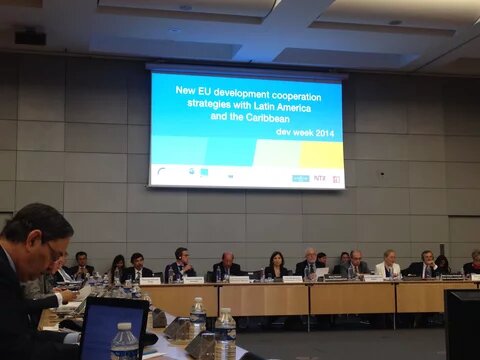President Humala: “The golden decade is about to arrive”
The President of Peru, Ollanta Humala, inaugurated on June 30th in Paris the seminar organized by the OECD’s Development Centre and the EU-LAC Foundation to analyse new strategies of the cooperation of UE in Latin America and the Caribbean. The seminar was also inaugurated by the heads of these institutions, Angel Gurria and Benita Ferrero-Waldner, respectively.
The seminar was held within the framework of the OECD’s Week for Development. The event counted with the support of the European Commission Programme EUROsociAL, which, in Ferrero–Waldner’s opinion, marks the beginning of cooperation between institutions for the benefit of the strategic bi-regional partnership.
President Humala defended in his speech the links between Latin America and Europe, but also with the Asia Pacific Forum, while the region-he said-has great potential and it needs to keep growing.
The Head of State argued that the "golden decade" is about to arrive to the region, although to achieve it "it will require investment in infrastructures and a more inclusive and sustainable development", argued President Humala.
"What one has witnessed (up till now) have been good years for commodity prices but, if there is no industrialization, diversification of productivity and modern states, there will be no golden age," sustained Humala and claiming that in his opinion one of the "big issues” of the region are not so much tariff barriers, as it is product quality, which requires investing in science, technology and vocational training.
Ferrero-Waldner called for the need of the EU to identify and implement new forms of cooperation with a region that, despite having registered a marked process of improvement in different fronts, still faces the risks arising from the so called "middle income trap", and hence, it cannot be excluded from international development cooperation mechanisms.
The EU-LAC Foundation President referred to the set of values and principles shared by the EU and Latin America to stress that they are being put to the test in the "post-Western" world towards which the global order is heading.
"The values embodied by the West, reflected in democratic societies pursuing equality of rights and opportunities for all, are faced today with greater income inequality gap in the world," warned Ferrero-Waldner, citing, among other studies that confirm this tendency, the ones recently published by the World Economic Forum and the NGO OXFAM.
According to this NGO, only 85 persons, the same number that would fit in a bus-today, concentrate the wealth with which the poorest of the world population live.
"When we think about social inequality, it’s impossible not to refer to Latin America and the Caribbean. Even though it has become a middle-income region, it still remains the most unequal region in the world," said Ferrero-Waldner, adding that "this is one of the reasons that Latin American and Caribbean countries still require cooperation from their strategic partner: the European Union", although the model of cooperation can’t be the same anymore.
According to Ferrero-Waldner, cooperation in terms of social inequality rooted on the simple transfer of resources, should be replaced shape towards a model of exchange of "good practices" in public policies so as to, foment social cohesion, prevent the middle income trap in Latin American and Caribbean, and to ensure that European countries maintain their social models, competitiveness, innovation and investment.
In arguiying for public policies aimed at creating public goods that guarantee equality of opportunities for access to education, employment, health and housing, Ferrero-Waldner underlined the role of the private sector sustaining that social cohesion is not an exclusive task for governments.
The General Secretary of the OECD, on the other hand, asserted that Latin America and the Caribbean are currently facing a "decisive moment" to stimulate reforms which will allow them to continue their growth.
"We must use the slowdown of external engines in order to be able to conduct a regional wave of major reforms to build more resilient, inclusive and sustainable economies," said Gurria and recalled that after one of the most important phases of expansion of its history, with a growth rate of 5 percent over the last five years, progress will be this year between 2 and 2.5 percent.
"The winds are changing in the region," Gurría warned and considered that "it is urgent" to improve productivity, terminate or reduce informality and "significantly" reduce inequality in a region that is "not the poorest region of the world but it is the most unequal one”.
*Picure by Michael Dean, courtesy of the OECD
Inauguration Address by President Humala
